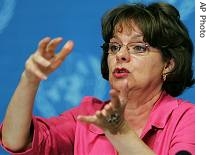-
(单词翻译:双击或拖选)
By Lisa Schlein
Geneva
06 December 2006
The World Food Program says the peace agreement between the Maoist rebels and government of Nepal is making it possible to deliver emergency assistance to hundreds of thousands of impoverished1 people living in one of the most remote and isolated2 corners of the country. Lisa Schlein reports for VOA from Geneva.
The World Food Program calls Humla, a remote region in the far Western part of Nepal, one of the world's forgotten crises. It says reaching this region is a logistical nightmare. There are no roads. So, the only way for aid agencies to reach the area is by helicopter. WFP spokeswoman, Christiane Berthiaume, has just returned from Nepal.
 |
| Christiane Berthiaume |
Berthiaume recounts her vivid memories of hundreds of people patiently waiting on the tarmac, watching the helicopter she was on as it was making its final approach.
"And, when we landed, they all rushed to us. And, I saw their faces, their grim faces. Their clothes were in rags. It was extreme misery," she said. "Little children with big bellies5, probably full of worms. Children that are barefoot because they have no shoes, no clothes. They have nothing. And, it is cold over there."
Nepal is one of the poorest countries in the world. Forty percent of the country's 27 million people live in areas that are food insecure. More than 50 percent are chronically6 malnourished, about half of the population lives on $1 a day.
Berthiaume says a recent crop assessment7 done by the World Food Program, the Food and Agricultural Organization and Nepalese government indicates that this year's harvest, once again, will not be good.
"When I was there, it was supposed to rain. It was the period where rain should have come. But, there was none," she noted8. "The sky was desperately9 blue and the sun was there. There was no rain. So, many of the men were preparing to go and walk long distances to India to go and find some work."
Berthiaume says it takes the men about 15 days to walk to India and 15 days to walk back home. Despite the hardships, she says they go because they have no choice. She says people in this remote part of Nepal have no resources. They have not had a good harvest for three years because of continuing drought.
 收听单词发音
收听单词发音
1
impoverished

|
|
| adj.穷困的,无力的,用尽了的v.使(某人)贫穷( impoverish的过去式和过去分词 );使(某物)贫瘠或恶化 | |
参考例句: |
|
|
|
2
isolated

|
|
| adj.与世隔绝的 | |
参考例句: |
|
|
|
3
considerably

|
|
| adv.极大地;相当大地;在很大程度上 | |
参考例句: |
|
|
|
4
destitute

|
|
| adj.缺乏的;穷困的 | |
参考例句: |
|
|
|
5
bellies

|
|
| n.肚子( belly的名词复数 );腹部;(物体的)圆形或凸起部份;腹部…形的 | |
参考例句: |
|
|
|
6
chronically

|
|
| ad.长期地 | |
参考例句: |
|
|
|
7
assessment

|
|
| n.评价;评估;对财产的估价,被估定的金额 | |
参考例句: |
|
|
|
8
noted

|
|
| adj.著名的,知名的 | |
参考例句: |
|
|
|
9
desperately

|
|
| adv.极度渴望地,绝望地,孤注一掷地 | |
参考例句: |
|
|
|















